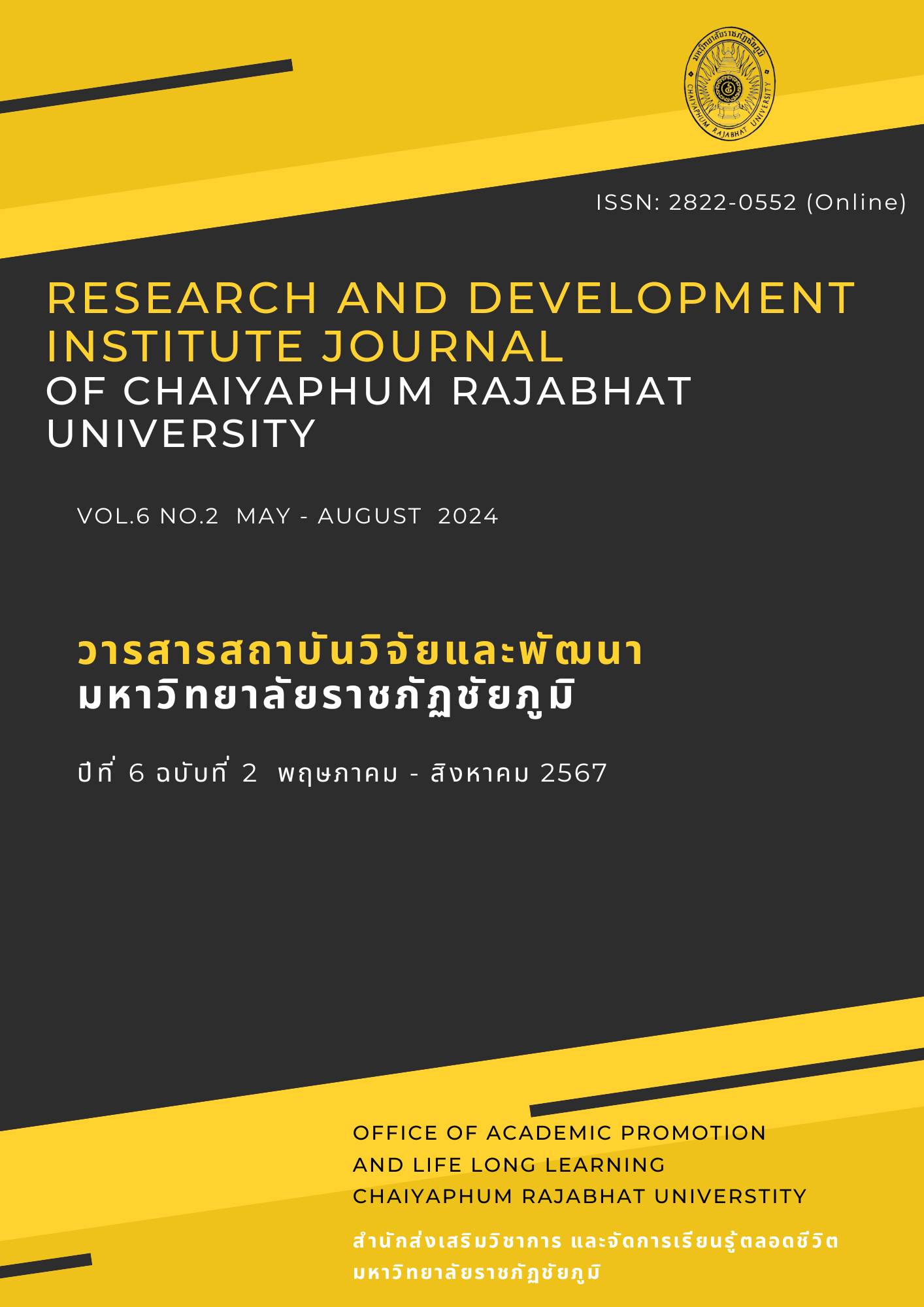A STUDY COLLABORATIVE COMPETENCY FOR MASTER’S DEGREE STUDENT CURRICULUM AND INSTRUCTION MAHASARAKHAM UNIVERSITY
Main Article Content
Abstract
This research aims to study the collaborative competencies of graduate students majoring in curriculum and instruction at Mahasarakham University in four aspects: 1) participation in work, 2) adaptation in work, 3) leadership in work, and 4) motivation in work. The research sample consists of 21 graduate students majoring in curriculum and instruction from the Faculty of Education at Mahasarakham University, selected through purposive sampling method based on criteria derived from applicants participating in voluntary activities to enhance teaching professional experience. Data collection tools include a proportional rating scale questionnaire with 5 levels, and statistical analysis methods include percentages, means, and standard deviations.
The results of this research showed that the collaborative competency of Master’s degree students in the curriculum and instruction program Mahasarakham University has mean of 4.62, which is at the highest level. The collaborative competency of Master’s degree students in the curriculum and instruction program Mahasarakham University as follows: Participation in work has an average score of 4.52, which is at the highest level. Adaptability in work has an average score of 4.80, which is at the highest level. Leadership qualities in work have an average score of 4.67, which is at the highest level. And Motivation in work has an average score of 4.49, which is at a high level.
Article Details

This work is licensed under a Creative Commons Attribution-NonCommercial-NoDerivatives 4.0 International License.
Permission to use text, content, images, etc. of publication. Any user to read, download, copy, distribute, print, search, or link to the full texts of articles, crawl them for indexing, pass them as data to software, or use them for any other lawful purpose. But do not use it for commercial use or with the intent to benefit any business. Published under a Creative Commons Attribution-NonCommercial-NoDerivatives 4.0 International License.

This work is licensed under a Creative Commons Attribution-NonCommercial-NoDerivatives 4.0 International License
References
คณะกรรมการอิสระเพื่อการปฏิรูปการศึกษา. (2564). แผนการปฏิรูปประเทศด้านการศึกษา. กรุงเทพฯ:สำนักงานเลขาธิการ คณะกรรมการอิสระเพื่อการปฏิรูปการศึกษา.
ทรงศักดิ์ ภูสีอ่อน. (2564). การวิจัยและพัฒนาทางการศึกษา. มหาสารคาม: ตักสิลาการพิมพ์.
มนตรี วงษ์สะพาน. (2563). พื้นฐานการวิจัยและการสอน (พิมพ์ครั้งที่ 2). มหาสารคาม: ตักสิลาการพิมพ์.
สำนักงานคณะกรรมการการศึกษาขั้นพื้นฐาน กระทรวงศึกษาธิการ. (2564). โครงการพัฒนาหลักสูตรการศึกษาขั้นพื้นฐาน พุทธศักราช.... (หลักสูตรฐานสมรรถนะ). https://cbethailand.com/หลักสูตร-2/กรอบหลักสูตร/บทนำ
สำนักงานเลขาธิการสภาการศึกษา กระทรวงศึกษาธิการ. (2560). แผนการศึกษาแห่งชาติ พ.ศ. 2560-2579. กรุงเทพฯ: บริษัท พริกหวานกราฟฟิค จำกัด.
Carrick, O. J. (2021). Striving for Parity: Classroom Collaboration of University Ethnic Diversity Students in Ecuador. International Journal of Multicultural Education. 23(2), 1–22.
Ekimova, V., & Kokurin, A. (2015). Students’ Attitudes towards Different Team Building Methods. Procedia-Social and Behavioral Sciences, 186(2), 47–55.
Ibrahim, D. S., &. Rashid, A. M. (2022). Effect of Project-Based Learning Towards Collaboration among Students in the Design and Technology Subject. World Journal of Education, 12(3), 1–10.
Ioannou, A., Demetriou, S., & Mama, M. (2014). Exploring Factors Influencing Collaborative Knowledge Construction in Online Discussions: Student Facilitation and Quality of Initial Postings. American Journal of Distance Education, 28(3), 83–95.
Johnson, D. W., & Johnson, E. P. (1994). Joining Together : Group Theory and Group Skills. Englewood Cliffs : Prentice-Hall.
Lin. L., Mills, L, & Ifenthaler, D. (2016). Collaboration, Multi-Tasking and Problem Solving Performance in Shared Virtual Spaces. Journal of Computing in Higher Education, 14(4), 44–57.
Luciano, M. M. (2018). Shared Team Experiences and Team Effectiveness: Unpacking the Contingent Effects of Entrained Rhythms and Task Characteristics. Academy of Management Journal, 61(4), 20–30.
Mikkelsen, B. (2005). Methods for development work and research: A new guide for practitioners. SAGE Publications.
Nichols, N., Gaetz, S., & Phipps, D. (2015). Generating Social Change Through Community-Campus Collaboration. Journal of Higher Education Outreach and Engagement, 19(31), 7-32.
Patrick, S. K. (2022). Organizing Schools for Collaborative Learning: School Leadership and Teachers Engagement in Collaboration. Educational Administration Quarterly, 58(4), 638-673.
Sanchez, A.V., & Ruiz, M. P. (2008). Competence - Based Learning: A Proposal for the Assessment of Generic Competence. Bilbao: University of Deusto.
Tschannen-Moran, M. (2001). Collaboration and the Need for Trust. Journal of Educational Administration, 39(4), 308–310.
Yeo, J., & Tan, S. C. (2011). How Groups Learn: Implications for Collaborative Work in Science. The Asia-Pacific Education Researcher, 20(2), 31–40.


